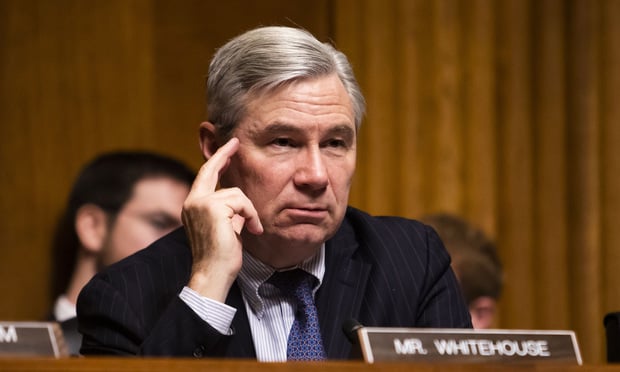'Politicians in Robes': Democrats Launch Push to Counter Conservatives' Judicial Strategy
"Our federal courts risk becoming little more than an arm of the Republican Party's big donors," the Senate Democrats' report reads.
May 27, 2020 at 01:13 PM
6 minute read
The original version of this story was published on National Law Journal
 Sen. Sheldon Whitehouse, D-Rhode Island, during a Senate Judiciary Committee hearing on Feb. 13, 2019. ( Photo: Diego M. Radzinschi/ALM)
Sen. Sheldon Whitehouse, D-Rhode Island, during a Senate Judiciary Committee hearing on Feb. 13, 2019. ( Photo: Diego M. Radzinschi/ALM)
Senate Democrats are going after conservatives' influence over the federal judiciary, but it's unclear how they plan to counter the immediate impact of President Donald Trump's wave of judicial nominees.
The lawmakers on Tuesday released a report they said marks the start of a campaign on conservatives' takeover of federal courts, which the document alleges is "the product of a long-term strategy to influence judicial selections and outcomes, which is well-funded by millions of dollars in anonymous, special-interest money."
Senate Judiciary Committee member Sheldon Whitehouse of Rhode Island, Senate Minority Leader Chuck Schumer of New York and Democratic Policy and Communications Committee Chairwoman Sen. Debbie Stabenow of Michigan are behind the report, titled "The GOP's Big Money Assault On The Constitution, Our Independent Judiciary, And The Rule of Law."
The report is arguably the strongest formal stance Senate Democrats have taken so far against Republicans' approach to the courts, an area where conservatives have long dominated but liberals have lagged.
The report promises that Senate Democrats will come up with "legislative solutions" in the near future to address what they described as "too much dark money" around the courts, as well as future reports to spotlight the conservative influence.
Schumer, Whitehouse and Stabenow on a call with reporters Tuesday cast their findings as the first step toward exposing and changing conservatives' influence on the courts. However, with Trump tapping nearly 200 Article III judges since taking office, it's unclear exactly how this effort will counter that immediate impact.
The report acknowledges that conservatives have been homing in on the courts for 50 years. And with Republicans controlling both the White House and the Senate, Democrats are limited in their tools to block nominees.
When asked by a reporter how Democrats would counter Senate Majority Leader Mitch McConnell of Kentucky if he tried to confirm a justice to the Supreme Court ahead of the November elections, Schumer said "public pressure" could play a role, after McConnell blocked D.C. Court of Appeals Judge Merrick Garland's nomination to the high court. "There will be tremendous pressure even on Republican senators, many of whom are very vulnerable, not to go along," the top Democrat said.
Tuesday's report took direct aim at the U.S. Supreme Court under Chief Justice John Roberts, where conservatives now hold a 5-4 majority. It refers to the court's conservatives as the "Roberts Five" and claims they have "undone decades of precedent and bent the law toward the interests of the rich and powerful."
"Now, with the addition of two hundred life-tenured Trump judges—more ideologically extreme and less experienced than any crop of judges in our nation's history—our federal courts risk becoming little more than an arm of the Republican Party's big donors," the report reads. "It has become abundantly clear in the Roberts era that the idea that Federalist Society-approved federal judges are umpires in an honest game with rules that are fair to all Americans regardless of wealth, race, gender, or sexual orientation is a dangerous fiction. The reality is that in cases with political implications, these judges too often behave as politicians in robes, inflicting lasting harm to basic principles on which our country was founded."
And it targeted the conservative Federalist Society for its role in selecting judges for Trump to nominate. The Federalist Society has said it is not directly involved in picking the nominees and does not take official partisan stances, but Tuesday's report alleges the group "has effectively become a judicial lobbying interest group."
"As political scientists and journalists have documented, it provides the nerve center for a complex and massively funded apparatus—composed of think tanks, law school centers, policy front groups, political campaign arms, and public relations shops—all designed to rewrite the law according to the political orthodoxy of Federalist Society donors," the report reads. "Under Trump, the group has all but assumed complete control over the administration's judicial selection and confirmation process, embedding its members in the White House and on the courts."
The report further spotlights the "dark-money" donors behind conservatives' efforts to touch the judiciary, highlighting the different organizations involved in shaping the right-wing approach to judicial nominees and courts like the Judicial Crisis Network.
The report also went after McConnell for prioritizing judicial confirmations in the Senate over passing legislation.
"Confirmation has become virtually automatic—a step in an assembly line finely tuned to achieve political and policy results through the judiciary," the report reads. "As a result of Senate Republicans' abdication of their constitutional duty, Trump's judicial nominees are younger, less experienced, and more ideologically extreme than any president's in history, and less diverse than any president's in decades."
The report is sure to prickle conservative judicial groups, who have argued they are doing nothing wrong in pushing their picks for open judgeships.
In an emailed statement, a spokesperson for the conservative Judicial Crisis Network sought to flip the script on Democrats, saying they "look forward to the Democrat report on the influence of the largest 'dark money' enterprise in America, Arabella Advisors, a multi-billion dollar dark money operation providing support and services to liberal groups like New Venture Fund, 1630 Fund, Demand Justice, Center for American Progress, and the League of Conservation Voters."
When asked about groups like Arabella Advisors during the call, Whitehouse said Democrats are "trying to undo dark money."
Senate Judiciary Committee Chairman Lindsey Graham of South Carolina recently defended Trump's pick for a seat on the U.S. Court of Appeals for the Fifth Circuit, Cory Wilson, after Democrats on the panel went after him over his conservative record, including attacks on the Affordable Care Act.
"The idea that you would be a conservative Republican is a bad thing only if you're a liberal Democrat," Graham said at the hearing last week. "Who do you think we're going to pick? We're going to pick people that think like us that will be good judges."
Read more:
Republicans Hire Chuck Cooper to Challenge House's Pandemic-Era Proxy Voting Rules
'Acrimony Between the Branches': How the Trump Lawsuits Could Shape Future House Legal Fights
This content has been archived. It is available through our partners, LexisNexis® and Bloomberg Law.
To view this content, please continue to their sites.
Not a Lexis Subscriber?
Subscribe Now
Not a Bloomberg Law Subscriber?
Subscribe Now
NOT FOR REPRINT
© 2025 ALM Global, LLC, All Rights Reserved. Request academic re-use from www.copyright.com. All other uses, submit a request to [email protected]. For more information visit Asset & Logo Licensing.
You Might Like
View All
Chicago Law Requiring Women, Minority Ownership Stake in Casinos Is Unconstitutional, New Suit Claims
5 minute read
Free Microsoft Browser Extension Is Costing Content Creators, Class Action Claims
3 minute read
Fired by Trump, EEOC's First Blind GC Lands at Nonprofit Targeting Abuses of Power
3 minute read
Indian Law Firm Cyril Amarchand Rolls Out AI Strategy, Adopts Suite of AI Tools
Trending Stories
- 1Public Notices/Calendars
- 2Wednesday Newspaper
- 3Decision of the Day: Qui Tam Relators Do Not Plausibly Claim Firm Avoided Tax Obligations Through Visa Applications, Circuit Finds
- 4Judicial Ethics Opinion 24-116
- 5Big Law Firms Sheppard Mullin, Morgan Lewis and Baker Botts Add Partners in Houston
Who Got The Work
J. Brugh Lower of Gibbons has entered an appearance for industrial equipment supplier Devco Corporation in a pending trademark infringement lawsuit. The suit, accusing the defendant of selling knock-off Graco products, was filed Dec. 18 in New Jersey District Court by Rivkin Radler on behalf of Graco Inc. and Graco Minnesota. The case, assigned to U.S. District Judge Zahid N. Quraishi, is 3:24-cv-11294, Graco Inc. et al v. Devco Corporation.
Who Got The Work
Rebecca Maller-Stein and Kent A. Yalowitz of Arnold & Porter Kaye Scholer have entered their appearances for Hanaco Venture Capital and its executives, Lior Prosor and David Frankel, in a pending securities lawsuit. The action, filed on Dec. 24 in New York Southern District Court by Zell, Aron & Co. on behalf of Goldeneye Advisors, accuses the defendants of negligently and fraudulently managing the plaintiff's $1 million investment. The case, assigned to U.S. District Judge Vernon S. Broderick, is 1:24-cv-09918, Goldeneye Advisors, LLC v. Hanaco Venture Capital, Ltd. et al.
Who Got The Work
Attorneys from A&O Shearman has stepped in as defense counsel for Toronto-Dominion Bank and other defendants in a pending securities class action. The suit, filed Dec. 11 in New York Southern District Court by Bleichmar Fonti & Auld, accuses the defendants of concealing the bank's 'pervasive' deficiencies in regards to its compliance with the Bank Secrecy Act and the quality of its anti-money laundering controls. The case, assigned to U.S. District Judge Arun Subramanian, is 1:24-cv-09445, Gonzalez v. The Toronto-Dominion Bank et al.
Who Got The Work
Crown Castle International, a Pennsylvania company providing shared communications infrastructure, has turned to Luke D. Wolf of Gordon Rees Scully Mansukhani to fend off a pending breach-of-contract lawsuit. The court action, filed Nov. 25 in Michigan Eastern District Court by Hooper Hathaway PC on behalf of The Town Residences LLC, accuses Crown Castle of failing to transfer approximately $30,000 in utility payments from T-Mobile in breach of a roof-top lease and assignment agreement. The case, assigned to U.S. District Judge Susan K. Declercq, is 2:24-cv-13131, The Town Residences LLC v. T-Mobile US, Inc. et al.
Who Got The Work
Wilfred P. Coronato and Daniel M. Schwartz of McCarter & English have stepped in as defense counsel to Electrolux Home Products Inc. in a pending product liability lawsuit. The court action, filed Nov. 26 in New York Eastern District Court by Poulos Lopiccolo PC and Nagel Rice LLP on behalf of David Stern, alleges that the defendant's refrigerators’ drawers and shelving repeatedly break and fall apart within months after purchase. The case, assigned to U.S. District Judge Joan M. Azrack, is 2:24-cv-08204, Stern v. Electrolux Home Products, Inc.
Featured Firms
Law Offices of Gary Martin Hays & Associates, P.C.
(470) 294-1674
Law Offices of Mark E. Salomone
(857) 444-6468
Smith & Hassler
(713) 739-1250








